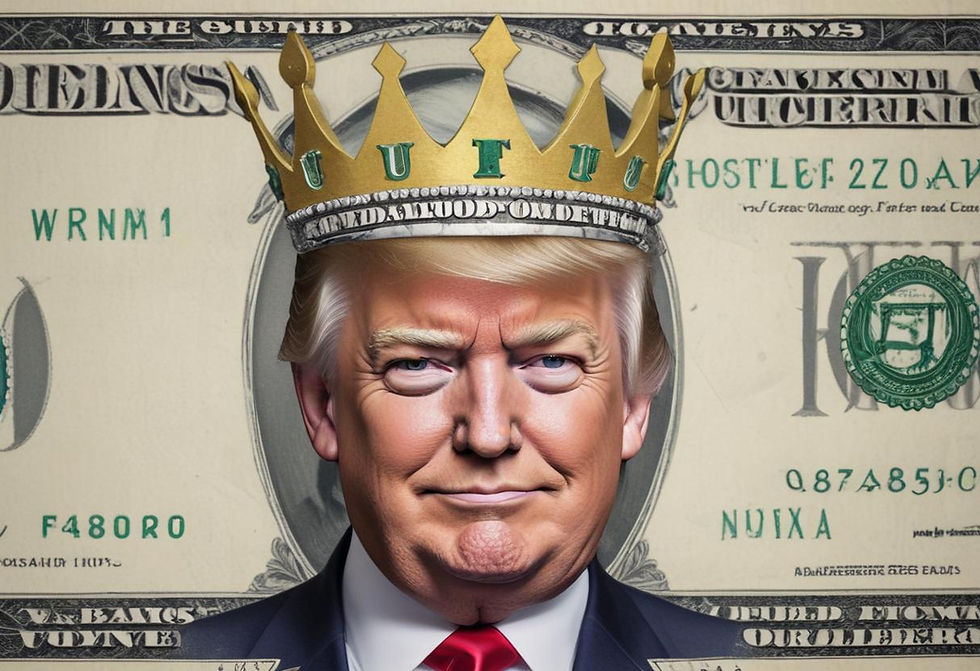Trump’s Economic Agenda: Crypto, Taxes, and Trade – Harris Campaign Reacts
- MarketAlley's Editorial

- Aug 4, 2024
- 3 min read
Former President Donald Trump recently laid out his comprehensive economic agenda, which includes a mix of innovative approaches and traditional strategies aimed at revitalizing the U.S. economy. His proposals cover a wide range of areas, including cryptocurrency, tax policy, and international trade, all of which reflect his vision for America's economic future.

Key Takeaways from Trump’s Economic Agenda
Innovative Solutions: Trump’s suggestion to use Bitcoin to address the national debt highlights his willingness to adopt unconventional economic policies.
Continued Tax Cuts: Emphasizing the success of his previous tax reforms, Trump advocates for further tax reductions to spur economic growth.
Strategic Tariffs: Trump proposes reciprocal tariffs to protect American industries and promote fair trade practices.
Harris's Stability Focus: Harris’s campaign emphasizes traditional economic policies and critiques Trump’s more radical suggestions as impractical.
Trump’s Economic Agenda: A Broad Spectrum of Policies
Cryptocurrency as a Debt Solution
In a surprising move, Trump suggested leveraging Bitcoin to address the U.S. national debt, which currently stands at $35 trillion. He floated the idea during an interview with Fox Business, saying, "Who knows? Maybe we'll pay off our $35 trillion dollars, hand them a little crypto check." This proposal underscores Trump's openness to integrating digital currencies into the national economic strategy, positioning the U.S. as a leader in the global cryptocurrency market.
Tax Cuts and Economic Growth
Trump emphasized his commitment to further tax cuts, building on the reforms he implemented during his presidency. He argued that previous tax cuts had increased federal revenue by stimulating economic activity.
Trump proposed additional reductions, particularly focusing on tax-free tipped wages, which he believes will support the service industry. "We took in more revenue with a smaller percentage of taxes," Trump asserted, advocating for continued tax relief to fuel economic growth.
Tariffs and Trade Policies
Trump also highlighted the role of tariffs in his economic agenda, advocating for reciprocal tariffs on countries that impose high tariffs on U.S. goods. "If they charge us 100% on cars, we charge them 100%," he stated. Trump argued that such measures are essential to protect American industries and ensure fair trade practices, thereby safeguarding domestic jobs and economic interests.
Harris Campaign’s Response to Trump’s Economic Agenda
Vice President Kamala Harris’s campaign responded promptly to Trump’s economic proposals. While Harris has not yet outlined a detailed stance on cryptocurrency, her campaign critiqued Trump's suggestions, emphasizing the need for practical and sustainable economic strategies.
Critique of Cryptocurrency Proposal
The Harris campaign flagged Trump’s Bitcoin proposal as impractical and lacking economic feasibility. A campaign spokesperson stated, "Trump's ideas on Bitcoin and national debt are not grounded in economic reality," highlighting the complexities involved in using digital currencies to manage national debt.
Emphasis on Stability and Traditional Policies
Harris’s campaign aims to present a contrast to Trump’s bold economic ideas by focusing on stability and proven policy measures. By advocating for traditional economic approaches, Harris positions herself as a reliable leader capable of managing the U.S. economy through steady and sustainable methods.
Broader Economic Context
Trump’s economic agenda comes at a time when the U.S. faces significant challenges, including high inflation, unemployment, and a substantial national debt. His proposals reflect a broader strategy to rejuvenate the U.S. economy by embracing both innovative and conventional economic tools.
Conclusion
As the 2024 presidential race intensifies, the economic policies of Trump and Harris will be a focal point of the debate. Trump's blend of innovative and conventional strategies aims to tackle the nation's economic woes head-on, while Harris advocates for stability and proven economic measures. Voters will have to weigh these competing visions as they decide the future direction of the U.S. economy.










Comments